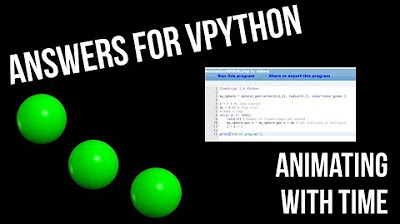PY4E - Functions (Chapter 4 Part 2)
Summary
TLDRThis video lecture introduces the fundamentals of defining and using functions in Python. It emphasizes the structure of a function, starting with the `def` keyword, and the importance of invoking functions to execute code. The discussion covers parameters and arguments, showcasing how they enhance a function's versatility. The concept of the `return` statement is explained, highlighting its role in providing output from functions. The lecturer encourages understanding functions as essential tools for code organization, especially in larger programs, while acknowledging that their necessity may vary in simpler scripts.
Takeaways
- 😀 Functions in Python are defined using the `def` keyword, followed by the function name and optional parameters.
- 🤔 The body of the function is indented, and it does not execute until the function is invoked.
- 🔄 The invocation of a function is necessary to run the defined code; simply defining it does not produce output.
- 📦 Functions help store reusable code, which reduces redundancy and enhances code organization.
- 💡 Parameters allow functions to accept input, making them flexible and adaptable to different situations.
- 🌍 The `return` statement provides output back to the caller, which can be used in further expressions.
- 🚫 Functions that do not return a value will implicitly return `None` at the end of their execution.
- 🛠️ Using functions is essential for managing complexity in larger programs and improving readability.
- 📊 Functions can take multiple parameters, and order matters when providing arguments during invocation.
- 📝 While functions are powerful, it's okay to start simple; the need for them will arise as coding projects grow.
Q & A
What is the purpose of the 'def' keyword in Python?
-The 'def' keyword is used to define a function in Python. It indicates that you are creating a new function, specifying its name and any optional parameters.
What happens when a function is defined but not invoked?
-When a function is defined but not invoked, it does not execute any of its code; it merely stores the function definition in memory without producing any output.
How does invoking a function differ from defining one?
-Invoking a function means calling it to execute its code, while defining a function means specifying its structure and behavior without executing it.
What is the significance of parameters in a function?
-Parameters allow functions to accept inputs, making them flexible and reusable for different scenarios. They serve as placeholders for values passed into the function.
How does a return statement work in a function?
-The return statement in a function ends the function's execution and optionally specifies a value to be returned to the caller. This allows the function to output a result.
What is the difference between a function that prints a value and one that returns a value?
-A function that prints a value outputs the result directly to the console, while a function that returns a value sends the result back to the caller, allowing it to be used in further expressions.
Can a function have multiple parameters, and how are they handled?
-Yes, a function can have multiple parameters, which are specified in the function definition. They are handled in the order they are defined when the function is called.
What are optional parameters in a function?
-Optional parameters allow functions to be called without providing all the arguments. If an argument is not provided, the function can use a default value.
Why might a programmer choose to use functions in their code?
-Using functions helps organize code, avoid repetition, and manage complexity, especially in larger programs, making the code more readable and maintainable.
When might a programmer feel the need to define a function?
-A programmer might want to define a function when they find themselves repeating code or when they need to perform a specific task multiple times in a program.
Outlines

此内容仅限付费用户访问。 请升级后访问。
立即升级Mindmap

此内容仅限付费用户访问。 请升级后访问。
立即升级Keywords

此内容仅限付费用户访问。 请升级后访问。
立即升级Highlights

此内容仅限付费用户访问。 请升级后访问。
立即升级Transcripts

此内容仅限付费用户访问。 请升级后访问。
立即升级浏览更多相关视频

Functions in Python | Python for Beginners

Functions in Python are easy 📞

Python Lambda Function - 19 | Lambda Function In Python Explained | Python Tutorial | Simplilearn

PYTHON FUNCTIONS | Python Tutorial - Lesson #58

PY4E - Functions (Chapter 4 Part 1)

Answers for VPython - Round 1, Ep 1 Animating with Time
5.0 / 5 (0 votes)
